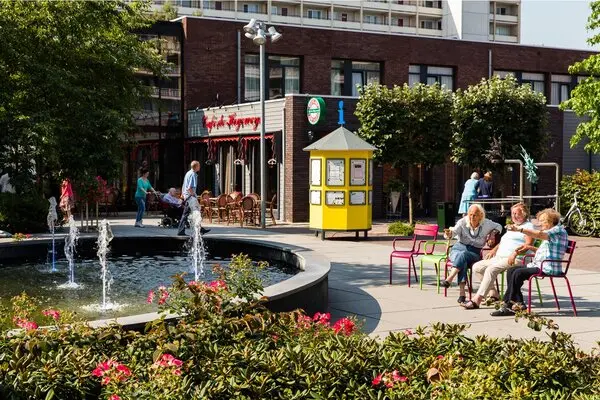Dementia Village planned for Durham with Ontario Tech-Alzheimer’s Society partnership
Published March 26, 2024 at 1:58 pm

With the number of Canadians living with dementia expected to nearly triple over the next quarter-century, the concept of a day use ‘Dementia Village’ in Durham Region is an idea that needs to be realized.
The Alzheimer Society of Durham Region and Ontario Tech University’s ‘Brilliant Catalyst’ innovation hub are doing just that with a Dementia Village concept already on the planning table and the dream just a few years away.
There is a dementia village in the Vancouver suburb of Langley; permanent long-term care residences for 188 people in a mini-town with the usual amenities like a grocery store and community centre, along with staff who are trained to deal with people with cognitive difficulties.
The village is based on the model of the world’s first dementia village in Weesp, Netherlands, called ‘Hogeweyk.’
The concept for the village planned for Durham – at a site still to be determined – will be day-use, however, with clients using the programs and services the Alzheimer’s Society already operates.
“A day-use village, using the village model, will be one-of-a-kind,” said Alzheimer Society of Durham Region (ASDR) CEO Gillian Barrie, who hopes to see the project running within the next five years.
“We’re still in the process of selecting a potential landing spot and we will have to do some fundraising,” she said. “How long it will take will depend on fundraising but it’s definitely a short-term future.”
“We’re hoping to see it built in the next five years.”
Generally, people living with dementia prefer to remain living in their homes for as long as possible while continuing to access community and home-based supports and services. But many families experience burnout and emotional distress from caregiving duties.
“This will be an opportunity for respite for the caregivers as well as an opportunity for clients to participate in out programs and services,” she said, noting that for every person in Canada who has dementia, a family member or friend will spend an average of 26 hours a week caring for them.

The organization believes people should be encouraged to live well with dementia but there is a lack of intentionally built dementia-friendly community spaces in Durham that are suited for people living with dementia and their care partners.
“ASDR has long recognized the value and significant impact that social and recreational programs can have on the lives of people living with dementia and their care partners,” Barrie said. “These programs provide cognitive stimulation, encourage peer support, relationship building, and a sense of purpose and belonging for our clients. We are excited to partner with Ontario Tech University on the development of a Dementia Village to bring an innovative solution to dementia care in our community.”
The possible solution that could at least offer a promise of hope is the village concept being developed by ASDR and the university.
The idea calls for a unique, dementia-friendly community space that is accessible, safe, inclusive and promotes activity, socialization, research initiatives and training programs to improve the quality of life for people living with dementia and their care partners.
On March 22 ASDR reviewed presentations for village designs developed by Ontario Tech students who have worked with the Brillian Catalyst hub. The student designs consider a wide range of criteria, including accessibility, transportation and cost, and considerations such as language and culture.
The village would also function as a learning environment to support teaching and training for Ontario Tech students as well as research initiatives to advance dementia care. The partnership will address the current lack of dementia research focusing on the experiences of diverse groups and racialized communities.
The Alzheimer Society of Durham Region has provided support and resources in the community for thousands of families for more than four decades as they navigate the difficult path together in caring for a loved one living with dementia. Each year, ASDR supports nearly 4,000 people impacted by dementia and it is estimated that by the end of this decade, close to 24,000 people in Durham will be living with dementia.
“Canada’s health-care system is just beginning to explore a holistic approach to health care combining social and medical models of wellness that encourages people living with dementia and their care partners to engage in activities to meet their non-clinical needs,” said Ontario Tech Research and Innovation Vice-president Dr. Les Jacobs. “Ontario Tech is delighted to work with Alzheimer Society Durham Region on the Dementia Village, an exciting initiative that also establishes the framework for the development and implementation of future community solutions.”
Barrie would certainly not disagree.
“This community space would function as a hub for program delivery, research, and training to ensure that all people living with dementia in Durham Region have access to the best care possible – now and in the future.”

The world’s first LTC Dementia Village in Weesp, Netherlands






